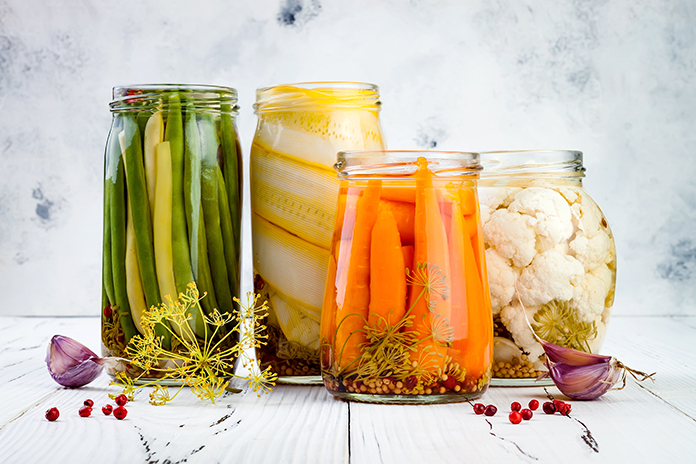The word “pickle” immediately brings to mind the pickled pearl onions and beets found on festive holiday tables. However, over time, pickles have evolved. Let yourself be inspired by a host of possibilities.
A bit of history
In the past, pickles were prepared during the late summer harvests to provide freshly preserved vegetables for the rest of the year. Made with one or more vegetables, vinegar, sugar and herbs, the pickling process tenderizes vegetables while retaining their crunchiness, extends their shelf life and lends them a much-sought-after tangy flavour.
Something for everyone
Pickle lovers are spoilt for choice at the grocery store and market: bell peppers, artichokes, eggplants, asparagus, grilled vegetables, dried tomatoes, hot peppers, olives, sauerkraut, kimchi, dill pickles, capers, etc. Almost any vegetable can be pickled and preserved! From a nutritional standpoint, keep in mind that pickles are often salty or sweet. They can also contain quite a bit of fat if you buy pickles preserved in oil. For their part, fermented sauerkraut and kimchi contain probiotic bacteria, which help build a healthy microbiota. Be sure to choose pickles with a label that has a short list of simple ingredients. The best way to enjoy healthier pickles is to make them yourself. And don’t worry. Pickling is a snap!
The ABCs of homemade quick pickles
- Choose a vegetable, making sure it’s as fresh as possible. Wash and cut it, if necessary. Cucumbers, mushrooms, cauliflower, beans, radishes, carrots, cabbage, fennel…let your inspiration and creativity run wild. Florette Farmer’s Selection shredded carrots, coleslaw and cut vegetables are perfect for making quick pickles.
- Place the vegetables in Mason jars until three-quarters full.
- Then, add herbs (e.g., French shallot, dill, finely sliced garlic) and whole spices (e.g., mustard, pepper or coriander seeds, cinnamon stick). Keep in mind that ground spices will alter the colour of the pickles.
- Pour vinegar (regular or flavoured) or a mixture of vinegar and water into a saucepan. Add a little sugar (e.g., white sugar, coconut sugar, honey, maple syrup) to firm up vegetables and add a good taste to the pickles. Finally, add coarse pickling salt, also known as kosher salt, sparingly. Do not use regular table salt as it will make the marinade cloudy. Bring to a boil.
- Pour the hot liquid over the vegetables. Let cool, then close the lid and refrigerate. These quick pickles will keep in the refrigerator for about a month.


